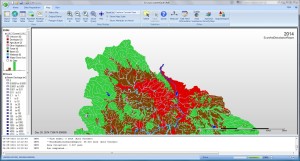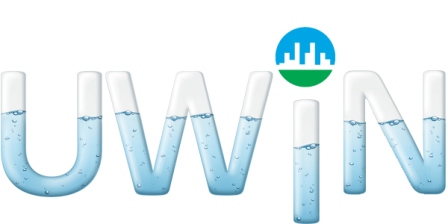Project D1-1
Project Team: Roy Haggerty, PI – Oregon State University
David Hulse – University of Oregon
David Conklin – Oregon Freshwater Simulations
Maria Wright – Oregon State University
Project Overview

Figure 1. Example of the Envision interface showing a portion of Portland, OR. Envision enables biophysical and human systems models to communicate via a landscape, a shared data repository that represents instantaneous conditions at specific locations. Each time a model runs, it draws its inputs form the landscape and outputs to the landscape. Envision has been widely used to conduct model based scenario assessments incorporating both biophysical and sociocultural dimensions of landscape change (Hulse et al., 2009; Santelmann et al., 2013; Bone et al., 2013).
This project will provide insight into how different urban water management strategies may mitigate risks and create resilience to pressures from climate and socioeconomic change. It will develop a tool for modeling future conditions of urban water systems, and regionally pilot the use of urban water sustainability indicators (developed by project D1-2) to measure the vulnerability, reliability and resiliency of urban water systems. The project will also develop web services that will enable researchers from all six UWIN study regions to calculate urban water sustainability indicators for their regions, and use the indicators to classify and compare urban water systems between regions, and assess the tradeoffs that result from different water management solutions.
A primary focus of this project will be on modeling future scenarios for the Willamette Basin, Oregon. To do this, we will adapt Envision, an alternative futures modeling framework developed at OSU, to model a ‘common core’ set of urban water system phenomena. UWIN Envision will simulate processes such as population growth, urban water demand, water distribution, storm drainage, water discharge, water reuse, urban microclimate, and the feedback between these and other processes. Local stakeholders will help define realistic assumptions for three futures scenarios and we will coordinate with CSU colleagues as they conduct parallel work for the Front Range region of Colorado. We will use the set of urban water sustainability indicators (identified by project D1-2) to compare scenarios. The UWIN-Envision code will be developed for application not just to Oregon but more generally to any of the UWIN regions, provided suitable region-specific map layers and input datasets are available.

Recent Comments